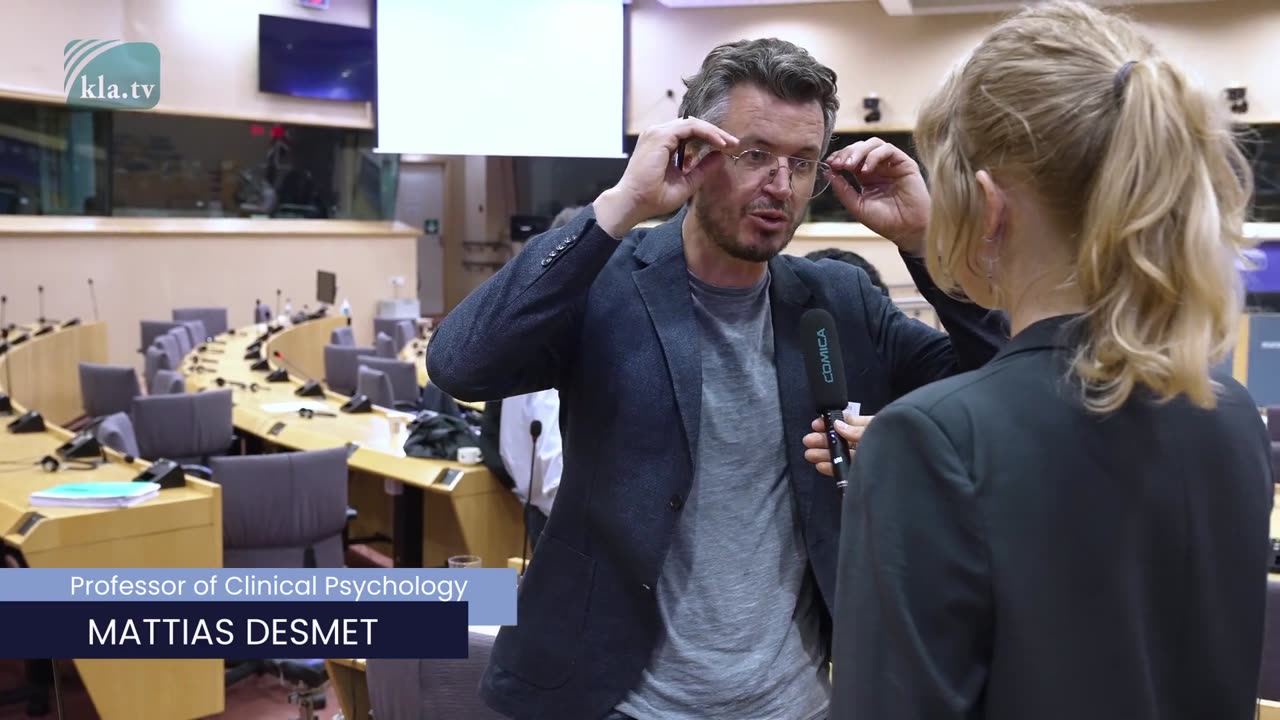Premium Only Content

“Mass Formation – The most important thing: To speak up sincerely!“
Prof. Mattias Desmet: “You have to never exclude someone because he or she thinks differently. If you're not vaccinated just consider the other human being who chooses to be vaccinated as a human being just like you and the other way around. If you might have chosen to get vaccinated just accept that there are people who think differently. (…) So that's one of the principles you really have to follow. Always refrain from dehumanization, stay humane in a world that is slowly dehumanizing”
Mattias Desmet is professor of clinical psychology in Gent (Belgium). His research program focuses on processes and outcomes of psychoanalytic psychotherapy. His publications have been widely discussed in the media, including The New York Post, Forbes, and Fox News. Desmet is the author of over one hundred academic writings. He is known as the world's leading expert on the theory of mass formation. Mass formation is the process of influencing mass opinion in a particular direction, excluding those who think differently.
Prof. Mattias Desmet investigated the extent to which the phenomenon of "mass formation" took place during the pandemic of COVID-19. The multiple award winning professor is also involved with the European Citizens' Initiative TRUST & FREEDOM, which was presented to the public in Brussels in early July. See in the following the exclusive interview that Kla.tv was able to conduct with Mattias Desmet during the press conference in Brussels.
Mr. Desmet
I started to speak out in the beginning of the corona crisis trying to warn people that society was in the grip of what I call the mass formation. And that when a mass formation emerges very often it leads to the emergence of a totalitarian system. So I wrote certain… several articles about that and then I gave several international interviews who were quite often viewed. And then one and a half year ago I published a book about it. “The psychology of totalitarianism”, explaining how exactly these systems emerge in a society and then explaining how they lead to a very strange phenomenon at the level of individual mental functioning, namely that once people are in the grip of a mass formation, they are incapable of taking a critical distance of what the group believes in. They start to become willing to radically sacrifice everything that used to be important for them before the mass formation and most important is that they become radically intolerant for dissonant voices. So that's the phenomenon of mass formation in a nutshell and what I explained in my book and in several interviews is the mechanism according to which it emerges, what happens in a society to make a mass formation emerge.
Kla.tv
And is there any kind of exit out of a mass formation?
Mr. Desmet
Yes, sometimes it stops spontaneously, sometimes it continues for a very long time. In particular if it is a support attempt by propaganda, if governments can use and sometimes even provoke mass formations through indoctrination propaganda and if propaganda is recirculated time and time again through the mainstream media, a mass formation can continue to exist for a very long time.
Kla.tv
So I suppose you say that we are in a mass formation right now, is that correct?
Mr. Desmet
You know, mass formation happens all the time actually. So usually on a very small scale and sometimes on a very large scale in the Soviet Union and in Nazi Germany prior to the onset of the totalitarian regimes that there was a large-scale mass formation. And now I think in the corona crisis for the first time in history we've seen the emergence of a worldwide mass formation, a mass formation in which a major or a substantial part of the world population was in the grip of a mass formation. So substantial part that usually means 20 to 30 percent, 20 to 30 percent but then there is an additional 60 - 65 percent who just goes along with the masses and who remains silent and while they know that something is wrong with the narrative, they just don't speak out. And then there is a an additional maybe five to ten percent, that depends a little bit, who knows that there is something wrong, who sees that the narrative in many respects is absurd and that tries to do something about it and then the first place that tries to speak out. And those are the five to ten percent who can make the mass formation and, or switch, or… but of course these people have to be very careful not to fall prey to a minor mass formation themselves because these people who do not go along with the major mass formation might fall prey to another mass formation that actually also happened I think to a certain extent in our society which leads to a very severe polarization of society in which a large mass formation, a large mass confronts a small mass.
Kla.tv
The consequence of that is like a very strong pressure in society, isn't it? But what would you recommend to… as like the key or like a possible way to create and give good energy into all this kind of pressure and mass formation stuff going on?
Mr. Desmet
Well, you know, if you look at the way in which a mass formation emerges then you always see that the root cause of the mass formation is loneliness. Throughout the last 200 years more and more people started to feel lonely and that has everything to do with the industrialization of society and with the excessive use of technology. And then once people feel lonely, they typically start to be confronted with a lack of meaning-making. They start to experience life as senseless, that's also you can understand that perfectly in a psychological way why lonely people in the end start to suffer from feelings of lack of purpose in life. And then once they feel lonely and experience a lack of meaning-making, people typically start to be confronted with so-called free-floating anxiety frustration and aggression. And that's a kind of anxiety frustration and aggression that is not connected to a mental representation. So people feel lonely, people feel anxious, frustrated, and aggressive without knowing what they feel anxious, frustrated, and aggressive for. And those are the conditions under which a mass formation might emerge, easily might emerge. That means that if under these conditions a narrative is distributed through the mass media indicating an object of anxiety and a strategy to deal with that object of anxiety then all this free-floating anxiety connects to this object of anxiety and people might be willing to follow the strategy to deal with that object of anxiety described in a narrative even when the strategy is utterly absurd. So people start to believe fanatically in a narrative which in many respects is wrong and absurd. And the state is similar to a state of hypnosis. In this state people are in the grip of the voice of the leaders of the masses. They just… or in the grip of the people who articulate the narrative in public space and as soon as you understand the mechanism of mass formation, I can't describe it in detail now, but as soon as you understand that you also realize that the only… that what you really have to do if you want to slow it down because you usually cannot wake up someone in the mass formation - because those 20 to 30 percent of the people who are really in the mass formation usually won't wake up - but if there are people who continue to speak out in a different way who continue to articulate a dissonant, dissident voice then they might not wake up, the people who are in the mass formation, but they will make sure that the mass formation doesn't go deeper and deeper and deeper and that it doesn't go to the last stage where the people in the masses start to become convinced. They start to become so intolerant for dissonant voices that they start to become convinced that they have to eliminate each and everyone who doesn't go along with them. So that's as soon as you understand the mechanism, you understand that dissonant voices are crucial to prevent the masses to go to the ultimate extremely destructive stage of the mass formation. So we - most important thing as always - that we continue to speak out in a way that is very sincere and honest not because we are convinced that we are the only ones that know the truth, no, because we are not. Everybody struggles to know the truth. So, but just because we want to live up to the ethical duty every human being has to articulate those words that seem at that moment to the best of our knowledge sincere and honest to us. So we have to continue to speak out in a… as sincerely as possible without trying to convince the other because that's counterproductive. Shouldn't try to convince the other. Just live up to the duty to speak out in a way, in a sincere way as possible. That's the first thing. Then you see in this way you will slow down the mass formation. And in this way strangely enough you will also cure the root cause of the mass formation which is the loneliness. Because it's exactly the sincere speech that is connecting people. It’s a sincere speech that makes people resonate with each other and it frees people from the psychological isolation and the loneliness that was the root cause of the mass formation. So no matter from what angle you look at it, it's crucial to speak out in as a sincere way as possible, as honestly as possible, as humble as possible. So not claiming that you know the truth, or not claiming that you know everything, that's not necessary. Just say like, look to me something feels wrong here and I will try to tell you why, how, what I feel, and why to me this narrative seems to be …. a certain respect. As soon as you start to speak out for instance you will feel that this process of mass formation makes sense, that it drives you, that it motivates you. If you continue to speak out under pressure you will feel that you evolve in a fast way as a human being. Speaking out under pressure, remaining sincere and honest, when there is a lot of pressure to stop speaking out is something that humanizes you that makes you go through a fast process, psychological process of a human being and you start to feel that everything makes sense. Nature did not create mass formations without reason. It created it with a reason.
Kla.tv
Yeah, thank you for this deep insight into all these connections. To summon things up could you summon your message into one, two sentences: What is important in these times or always to be this little spice in all this mass formation?
Mr. Desmet
Yeah, I think, you know, mass formations and emerging totalitarianism always dehumanize society. They force everyone into the same way of thinking. They impose one ideal image to each and everyone. And meaning that in the end it dehumanizes individuals because it makes them lose their characteristics as an individual and replaces the individual identity by a group identity. So mass formation is extreme collectivism and as soon as you understand that you see the simple principle. In a world that is dehumanizing you have to stay loyal to the principles of humanity you have to stay humane, you have to never exclude someone because he or she thinks differently. If you're not vaccinated just consider the other human being who chooses to be vaccinated as a human being just like you and the other way around. If you might have chosen to get vaccinated just accept that there are people who think differently. So that's one of the principles you really have to follow. Always refrain from dehumanization, stay humane in a world that is slowly dehumanizing that's one thing I could say besides many other things.
from Paz.
Sources/Links:
Massformation als Massenpsychose
https://www.provegan.info/de/infothek/menschenrechte/mass-formation-als-massenpsychose-bei-ernaehrung-und-corona/
-
 8:22
8:22
Russell Brand
10 hours agoThey want this to happen
153K336 -
 2:06:43
2:06:43
Jewels Jones Live ®
1 day ago2025 STARTS WITH A BANG! | A Political Rendezvous - Ep. 104
84K30 -
 4:20:41
4:20:41
Viss
10 hours ago🔴LIVE - PUBG Duo Dominance Viss w/ Spartakus
67.5K6 -
 10:15:14
10:15:14
MDGgamin
13 hours ago🔴LIVE-Escape From Tarkov - 1st Saturday of 2025!!!! - #RumbleTakeover
56.6K2 -
 3:54:19
3:54:19
SpartakusLIVE
9 hours agoPUBG Duos w/ Viss || Tactical Strategy & HARDCORE Gameplay
69.5K1 -
 5:54:54
5:54:54
FRENCHY4185
10 hours agoFRENCHY'S BIRTHDAY BASH !!! THE BIG 40 !!!
79.4K3 -
 1:23:33
1:23:33
Michael Franzese
18 hours agoThings to look forward to in 2025
97.3K47 -
 3:23:02
3:23:02
I_Came_With_Fire_Podcast
19 hours agoDefeating VICTIMHOOD: Advocacy, Resiliency, and Overcoming Abuse
103K19 -
 2:00:56
2:00:56
Game On!
1 day ago $10.35 earnedNFL Experts debate if Joe Burrow will make HISTORY in Week 18!
117K16 -
 2:07:57
2:07:57
InfiniteWaters(DivingDeep)
4 days agoHOW TO ENTER 2025 LIKE A BOSS!
45.9K1